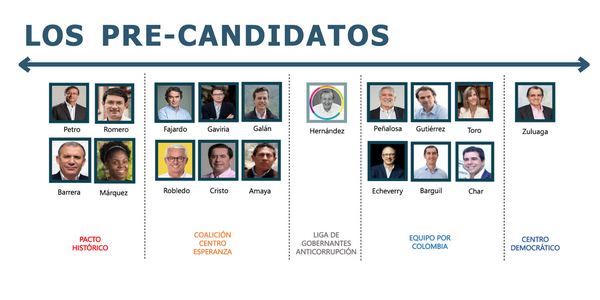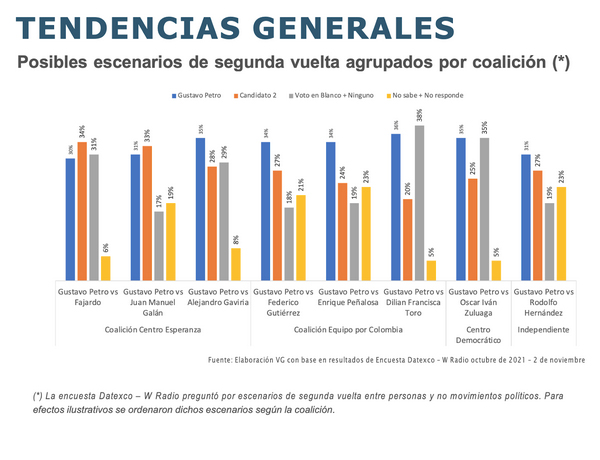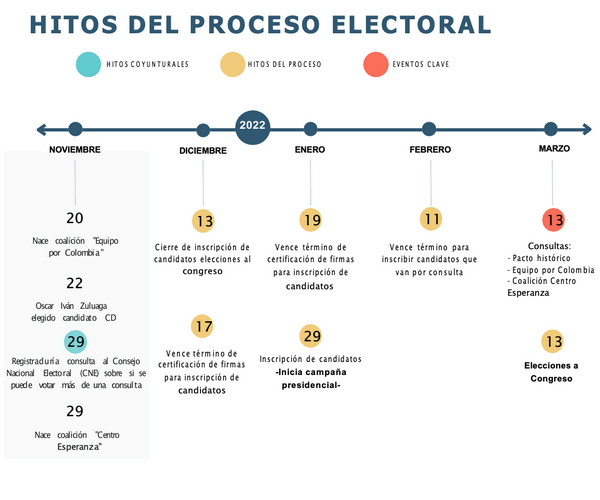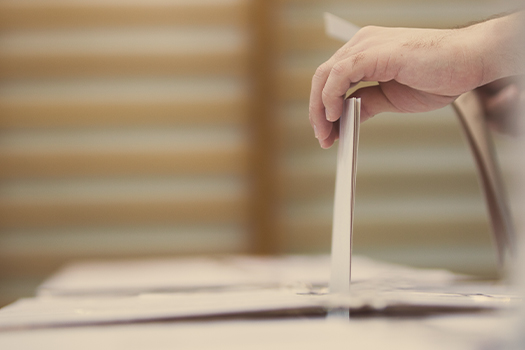November 2021
Analysis of the milestones, issues and events highlighting the road map to elections.
Prepared by Virtus Global

Pre-candidates Colombia 2022
In November, three (3) coalitions of candidates that run for the Presidency of the Republic of Colombia and two (2) confirmed individualnominations were set. It is noteworthy the continuity of the independent candidacy of Rodolfo Hernández, former mayor of Bucaramanga. Additionally, there could be a future “alliance” between Óscar Iván Zuluaga and Equipo por Colombia.

Datexco – W Radio Poll
According to the Datexco – W Radio Poll, Sergio Fajardo would be the candidate with the highest voting intention of the Centro Esperanza Coalition in a second-round scenario with Gustavo Petro. However, the gap between Fajardo and Petro is the same as between Galán and Petro.
For his part, the candidate with the greatest voting intention in Equipo por Colombia in this scenario is Federico Gutiérrez. Although, it is lower than that of candidate Gustavo Petro.
Depending on who will confront Gustavo Petro in the second-round, two types of contexts are set for candidates’ votes increase:
1. For Fajardo, Gaviria, Zuluaga and Toro: Does not know/Does not respond, less than 10%, and a Blank Vote or None, higher than 29%. (Less favorable to increasing votes).
2. For Galán, Gutiérrez, Peñalosa, and Hernández: Does not know/Does not respond, more than 19% and Blank Vote or None, less than 8%. (More favorable to votes increasing).

Electoral Process Milestones Colombia 2022
STRATEGIC ISSUES OF POLITICAL AGENDA
Security
Federico Gutierrez pointed out that criminal structures such as the FARC dissidents, ELN, and Clan del Golfo have regained control in many country areas. They would be fought by this administration because they represent a country’s threat.
Enrique Peñalosa asserted that the first thing is security. It implies the strengthening of the National Police, the intelligence services of the Army and the Police, reforms to the justice system to guarantee sanctions and construction of prisons.
Juan Carlos Echeverry pointed out President Duque failed in his security policy. We only have to look at the situation in Cauca, Nariño, Chocó, and Arauca, or regions such as El Catatumbo or Northeast Antioquia.
Economy
Gustavo Petro assured that the first decision he would make would be to cease contracting for oil exploration in Colombia. This proposal generated a rejection by the other candidates in the race, unions, and experts.
Diego Mesa, Minister of Mininig and Energy, affirmed that the sudden suspension of oil exploration and exploitation would mean increasing the gas bill by five or six times,depending on imported gas. In six years Colombia would have to import about 400,000barrels per day, and 95,000 direct jobs would be lost.
Enrique Peñalosa pointed out entrepreneurs of all sizes have to be national heroes because we will not get out of poverty only with subsidies, we need growth rates above 5%and 6% per year.
Sergio Fajardo announces that his environmental proposal has four axes. 1. Fight against deforestation with a comprehensive approach. 2. Address climate change given a central role to adaptation. 3. Protection and sustainable use of biodiversity. 4. Defense of water as a strategic resource.
Democracy
President Iván Duque confirmed that the Budget Law and the article that modifies the Guarantees Law will be included, despite that a judge having ordered the measure’s suspension. He emphasizes that a judge does not have the power to tell the head of State what he should or should not object.
Juan Manuel Galán denounced that the modification to the Guarantee Law would be givingway to using public resources for electoral purposes and guaranteeing fraud in the next elections in 2022.
Gustavo Petropointed out that half a million volunteers are needed, including 120,000voting juries, to guarantee transparency in the elections. The National Civil Registry responded that the voting juries are chosen with software allowing an electronic lottery to be carried out.
Federico Gutiérrez, Enrique Peñalosa, and Óscar Iván Zuluaga questioned the taking of judicial decisions close to the elections due to a ruling by the Comptroller’s Office onHidroituango, which affects Fajardo’s aspiration.
The Organization of American States, OAS, announced that they would deploy a mission in Colombia to oversee both the legislative and presidential elections next year.
International Relations
Federico Gutiérrezproposed to continue with the diplomatic siege against the Venezuelan regime of Nicolás Maduro.
Gustavo Petro promised to reestablish diplomatic and consular relations with Venezuela.
CAMPAIGN TIMES
In November, these were the main events that defined the route of Colombia’s 2022presidential and legislative elections.
- John Milton Rodríguez, from Colombia Justa Libres and Aydeé Lizarazo from Partido Mira, will be the two presidential candidates of the Christian parties.
- Gustavo Petroargued that his party, Colombia Humana, will not present the 2022 legislative elections lists.
- Partido Verde releases its members and leaders who support their choice.
- The National Civil Registry did not accept the signatures from the political movement led byRodolfo Hernández, Liga contra la Corrupción, because they did not comply with the requirements.
- The National Electoral Council affirmed that the 16 seats of the Special Circumscription of Peace are guaranteed, and the armed conflict’s victims must fulfill them.
- Luis Pérez, former Governor of Antioquia, proposed that Partido Liberal go to a consultation in March 2022 with Gustavo Petro. Then, he retracted.
- The Centro Esperanza and Equipo por Colombia Coalition were formed. Additionally, Óscar Iván Zuluaga was elected as official candidate of Partido Centro Democrático. Alejandro Gaviria announced his break with Partido Liberal.
- The Comptroller General’s Office confirmed the ruling in the Hidroituango case. Among the people responsible is Sergio Fajardo.
NOVEMBER HIGHLIGHTS
1. The list of candidates in the electoral contest begins to be refined with the formation of three (3) coalitions or alliances, representatives of traditional political groups, and the independent candidacy of Rodolfo Hernández and the one of Óscar Iván Zuluaga.
2. Although Gustavo Petro is the best positioned in the polls, the uncertainty among Colombians when choosing a candidate is representative. According to the poll conducted by Dugon in early November, 59% of those polled are undecided about their vote intention. Additionally, according to the polls, within the established alliances, only Sergio Fajardo andJuan Manuel Galán would defeat Petro in a second round.
3. Two candidates in the race, Juan Manuel Galán and Gustavo Petro have made statements on electoral fraud. The first was related to the Guarantees Law and the second on the electoral witnesses. Since the candidates perceive their candidacies harmed, they will resort more to this type of statement, pointing out failures in the system as part of their positioning strategy.
4. New statements are expected from Gustavo Petro -such as those referring to extractive activity- seeking prominence and leadership in the public debate on the electoral agenda issues.
5. The candidates Enrique Peñalosa, Federico Gutiérrez, and Juan Carlos Echeverry from Coalition Equipo por Colombia have been critical on national security and defense issues, even though they are close to the current administration. This common position reaffirms the general concerns about security and the relevance that this issue will have in the electoral process.
